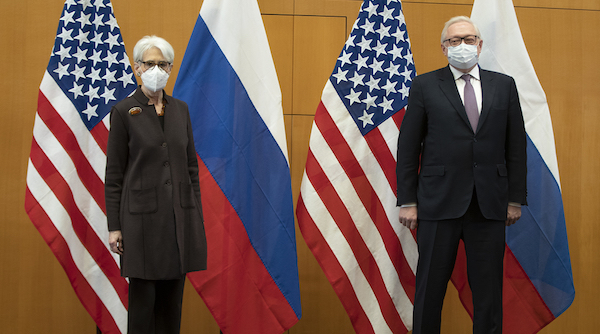
US Deputy Secretary of State Wendy Sherman (L) and Russian Deputy Foreign Minister Sergei Ryabkov meet at the US diplomatic mission in the Swiss city of Geneva on January 10, 2022. (Photo via social media networks)
Top US and Russian officials have held high-stake talks aimed at easing tensions over Ukraine amid warnings by NATO that Russia would face "severe costs" if it launched an attack on its former Soviet neighbor.
The negotiations started after US Deputy Secretary of State Wendy Sherman and Russian Deputy Foreign Minister Sergei Ryabkov opened their meeting at the US diplomatic mission in the Swiss city of Geneva at 8:55 a.m. local time (0755 GMT) on Monday.
The talks, held after a weeks-long standoff over Russian troop deployments near its border with Ukraine, focused on a wide-ranging new security arrangement that Moscow is seeking with the West over NATOís eastward expansion and Kievís membership in the US-led military alliance.
The two diplomats had already met informally on Sunday evening, with Ryabkov telling Russian news agencies that the first meeting had been "difficult." Russiaís state news agency RIA Novosti quoted Ryabkov as saying on Monday that he feared Washington was not taking seriously Moscowís demand of an end to NATOís eastward expansion.
Pointing to a 2008 promise by NATO to consider membership for Ukraine and others, the Russian deputy foreign minister told RIA Novosti, "Are they ready to give legal guarantees that this country, as well as other countries...will not join NATO? I have a rather pessimistic forecast in this regard."
Sherman, for her part, said on Twitter that the talks were underway but there would be little progress without others at the table. "The US will listen to Russiaís concerns and share our own, but we have been clear we will not discuss European security without our allies and partners."
The extraordinary session of the bilateral Strategic Stability Dialogue is now underway in Geneva. The U.S. will listen to Russia’s concerns and share our own, but we have been clear we will not discuss European security without our Allies and partners. pic.twitter.com/QkYlu1HdhU
— Wendy R. Sherman (@DeputySecState) January 10, 2022
The US State Department said the American diplomat had stressed in the talks on Sunday "the freedom of sovereign nations to choose their own alliances."
A meeting of the NATO-Russia Council is also scheduled to take place in Brussels on Wednesday, and then the permanent council of the Organization for Security and Cooperation in Europe (OSCE) will meet in Vienna the next day with the issue of Ukraine expected to dominate.
Ahead of the talks on Monday, NATO Secretary-General Jens Stoltenberg warned Russia of "severe costs" if it launched an attack on Ukraine. "We need to send a very clear message to Russia, that we are united and that there will be severe costs - economic, political costs - for Russia if they once again use military force against Ukraine." Reiterating NATOís support for Ukraine, Stoltenberg said he did not expect the talks to "solve all the issues," but expressed hope that the negotiations could pave the way for a diplomatic solution. "We are aiming for an agreement on a way forward, a process, a series of meetings," he said. "We are working hard for a peaceful political path and we are ready to continue to work with Russia to try to find that path towards a peaceful solution."
Western governments accuse Russia of planning "an invasion" of Ukraine amid military buildup near the Ukrainian border. Moscow rejects the allegation and insists that deployments are defensive in nature.
Moscow has repeatedly reiterated that expansion of the NATO military infrastructure in Ukraine is a red line for it and that any future expansion must exclude Ukraine and other former Soviet countries.
Last month, the Russian government made demands on NATO and Ukraine about the future of their relationship, calling on the Western military alliance to deny Ukraine membership to NATO and to roll back its military deployments. Moscow also proposed that the US not establish any military bases in former Soviet states that are not part of NATO, nor develop a bilateral military alliance with them. NATO, however, strongly rejected the proposals, stressing that the alliance will not abandon its basic principle of freedom for countries to join military blocs.
Russian President Vladimir Putin has previously warned that Moscow will act if NATO crosses its red lines in Ukraine.
LINK: https://www.ansarpress.com/english/25968
TAGS:






























 online news tv
online news tv




